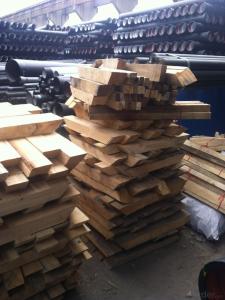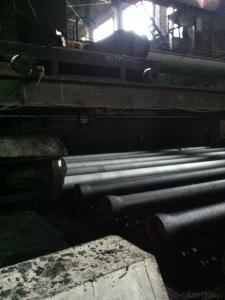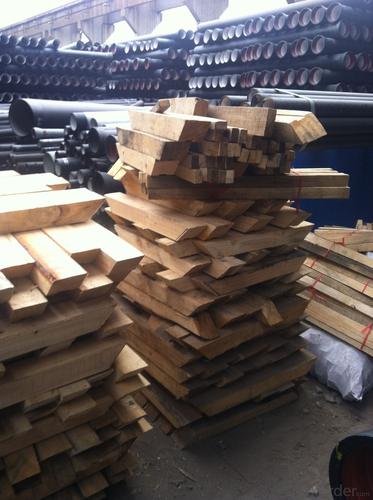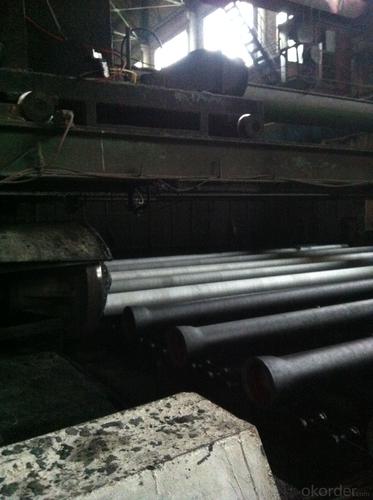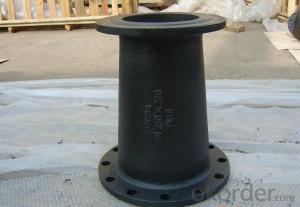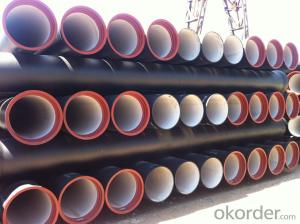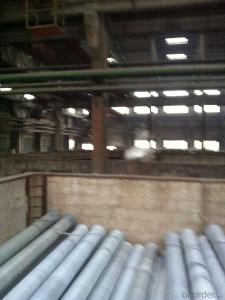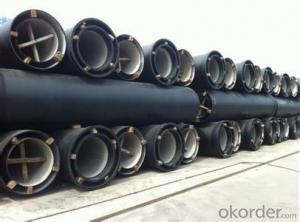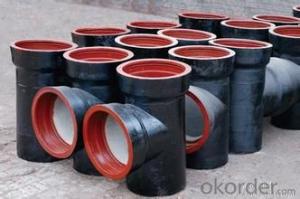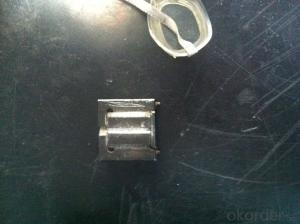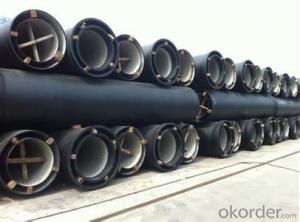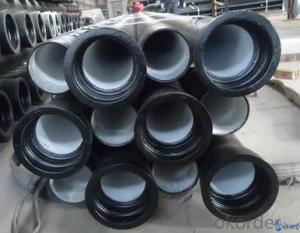DUCTILE IRON PIPEs K9 CLASS DN100
- Loading Port:
- Tianjin
- Payment Terms:
- TT OR LC
- Min Order Qty:
- 20 pc
- Supply Capability:
- 3000 pc/month
OKorder Service Pledge
OKorder Financial Service
You Might Also Like
Specifications
Subsidiary of Forbes Fortune 500 company (Ranking 485th in 2011). Provides full rang of ductile iron pipes with finest quality.
Company Profile
CNBM International Corporation belongs to China National Building Material Group Corporation (CNBM Group), ranking 365th in Forbes world Fortune 500 companies of 2012, and one of the largest state-owned companies in China since 1984. CNBM International was founded to provide sales support to international customers for the CNBM family of plants.
CNBM DIP Division is specialized in manufacturing high quality ductile iron potable / sewage water pipeline products in China. Ductile iron and cast iron pipe, fittings, valves, hydrants and drainage products are our main products, and orders are now shipped all over the world.
Our aim is to become an world-class influential supplier and professional service provider in world water industry.
- Q: How long does the cast iron pipe of indoor direct buried sewage need to be examined?
- UPVC, also called hard PVC, is an amorphous thermoplastic resin made by polymerization of vinyl chloride monomer, with certain additives (such as stabilizers, lubricants, fillers, etc.). In addition to additives, the method of blending with other resins is also applied to make it have obvious practical value. These resins are CPVC, PE, ABS, EVA, MBS and so on. UPVC has high melt viscosity and poor flowability. Even if the pressure and melt temperature are increased, the fluidity is not changed. In addition, the molding temperature of the resin is very close to the thermal decomposition temperature, and the molding temperature range is very narrow. It is a difficult material to be formed.
- Q: How does ductile iron pipe perform in areas with high groundwater salinity?
- Ductile iron pipe performs well in areas with high groundwater salinity due to its corrosion resistance properties. The iron pipe is coated with a protective layer that prevents corrosion and extends its lifespan, even in saline environments.
- Q: DN300 how long is it for water polo and iron pipes?
- Cast iron pipe (Cast Iron Pipe) with the cast iron casting pipe cast iron pipe for water supply and drainage gas pipeline pipe fittings including cast iron casting with fatigue strength by continuous cast iron pipe from the cast iron pipe from the cast iron pipe sand metal two according to material with grey cast iron pipe, ductile iron pipe at the interface with flexible sealing interface LAN interface, self anchored interface, interface of the rigid flexible cast iron pipes rubber ring;
- Q: General cast iron prices now
- Hello friends, Tianjin is in Shandong Qingdao 6500 7300 yuan / ton to 7100 yuan a ton of Zhejiang 7500 to 9000 yuan a ton, this is a great relationship, and the production of raw materials, for reference only, we are ductile casting manufacturers, the information can not say 100% accurate but can reference.
- Q: Do rigid cement cast iron pipes need cement piers?
- Ductile iron pipes mainly called centrifugal ductile iron pipe, it has the properties of nature, iron and steel, excellent corrosion resistance, good ductility, good sealing effect, simple installation, mainly for municipal, industrial and mining enterprises, water supply, gas, oil etc.. Water supply pipe is the first choice, with high cost performance. Compared with the PE pipe, from the installation time, ductile pipe PE pipe installation is simple and rapid, and after the installation of internal and external pressure bearing better tightness and corrosion resistance; from the point of view, ductile pipe sealing better after installation, but also can improve the corrosion resistance of corrosion protection through a variety of means; from the hydraulic performance, because ductile pipe specifications generally refers to the inner diameter of PE pipe diameter specifications generally refers to the same specifications, because under the condition of ductile pipe can achieve greater runoff; from the installation and maintenance cost, ductile pipe have more favorable price. The main components of ductile iron pipes are carbon, silicon, manganese, sulfur, phosphorus and magnesium. The inner wall of zinc spray, anti-corrosion materials such as cement mortar.
- Q: Can ductile iron pipe be used for hydropower systems?
- Ductile iron pipe is perfectly suitable for hydropower systems. It is renowned for its robustness, longevity, and ability to resist corrosion, making it an excellent option for numerous applications, including hydropower systems. The remarkable tensile strength of ductile iron enables it to endure the immense pressure and heavy loads associated with such systems. Additionally, its resistance to corrosion makes it ideal for use in water environments, ensuring a lengthy lifespan and minimal maintenance requirements. Consequently, ductile iron pipe can effectively serve hydropower systems by offering a dependable and efficient solution for water transportation and infrastructure support.
- Q: What is ductile iron?
- Ductile iron, after being treated with either magnesium or cerium, undergoes an improvement in its mechanical properties. This particular type of cast iron earns the name "ductile" due to its higher degree of ductility in comparison to other cast iron varieties. Ductility pertains to a material's capacity to stretch or deform without breaking. This quality renders ductile iron particularly ideal for applications that demand both high strength and resistance to wear and tear, such as pipes, automotive components, and machinery parts. The inclusion of magnesium or cerium during the manufacturing process aids in the formation of graphite within the iron's structure, contributing to its distinctive properties. This graphite formation serves to enhance the iron's flexibility and reduce its brittleness, enabling it to absorb shock and vibrations without fracturing. As a whole, ductile iron presents a fine balance between the strength of cast iron and the flexibility of steel, thereby establishing itself as a versatile material well-suited for diverse industrial applications.
- Q: How do ductile iron pipes handle ground settlement due to construction activities?
- Ductile iron pipes have the ability to handle ground settlement caused by construction activities due to their flexibility and strength. These pipes are designed to withstand external pressure and can accommodate minor ground movements without significant damage or failure. The ductility of the material allows the pipes to deform slightly, absorbing the ground settlement and preventing them from cracking or breaking. Additionally, the joints in ductile iron pipes are typically flexible, allowing for further movement and reducing the risk of leakage or structural issues. Overall, ductile iron pipes are well-suited for withstanding ground settlement and ensuring the integrity of the pipeline system during construction activities.
- Q: Can ductile iron pipes be used for river crossings?
- Ductile iron pipes are suitable for river crossings. With their strength and durability, they can endure the pressure and stress of being buried and crossed by a river. Ductile iron is widely used in water and sewage systems, proving its reliability for river crossings. Nevertheless, it is crucial to account for additional factors like river depth, pipe size and weight, and the installation procedure. This guarantees the appropriate design and installation of ductile iron pipes for river crossings.
- Q: Method for cutting large diameter ductile iron pipe
- When the oxygen and acetylene volume ratio is greater than 1.2, is formed. As more oxygen, burning, the flame length is shortened obviously, cone tapered inner flame almost disappeared, and a strong desire. Making due to oxygen, the oxidation of metal, so are not widely used, only used for welding of brass, to prevent evaporation of zinc.
Send your message to us
DUCTILE IRON PIPEs K9 CLASS DN100
- Loading Port:
- Tianjin
- Payment Terms:
- TT OR LC
- Min Order Qty:
- 20 pc
- Supply Capability:
- 3000 pc/month
OKorder Service Pledge
OKorder Financial Service
Similar products
Hot products
Hot Searches
Related keywords
